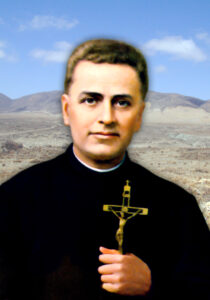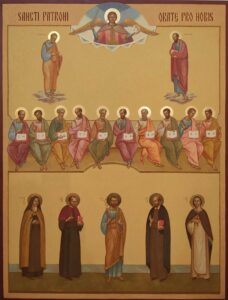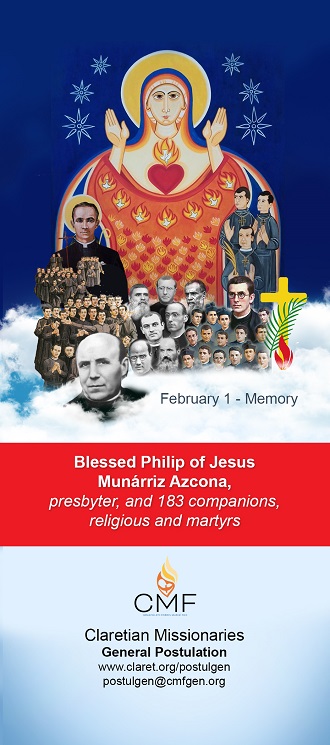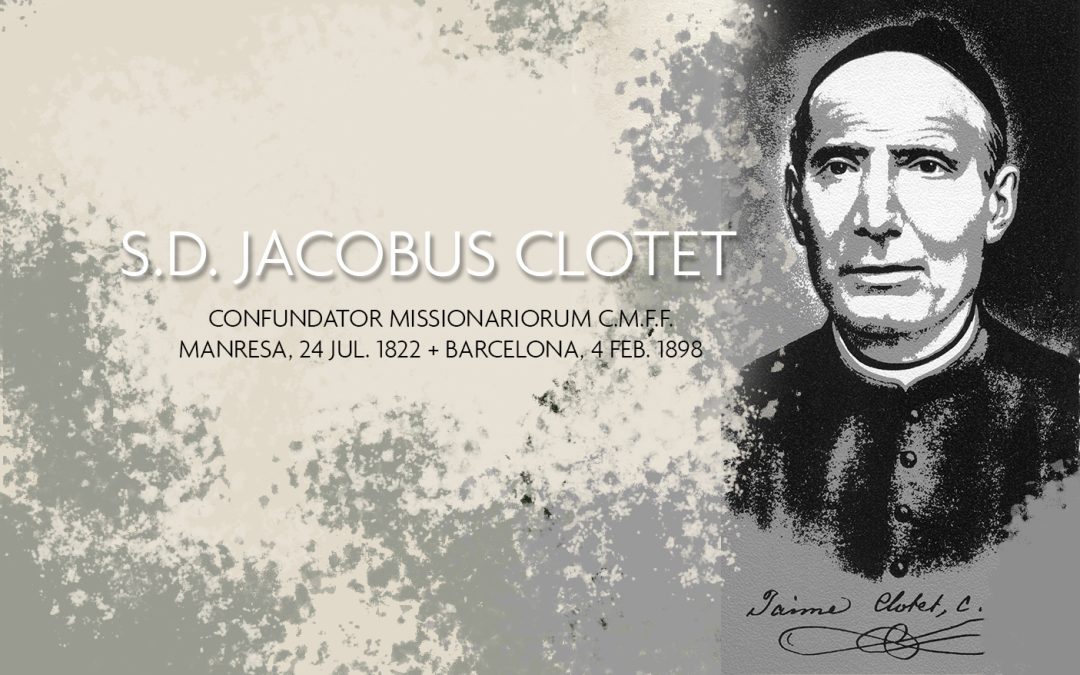
Jul 23, 2022 | Noticeboard
Co-founder of the Congregation of Missionaries Sons of the Immaculate Heart of Mary
—————————————————
Jaime Clotet was born in Manresa (Barcelona) on 24 July 1822, the last of eight children. His parents, Mr. Ramón Clotet and Mrs. Gertrudis Fabres, of a good social position and religious spirit, gave Jaime a careful education based on the holy fear of God. When he was only nine, he joined the Congregation of San Luis Gonzaga. Anyone who knew him in his mature years could see how he retained “all the freshness and immaculate candor of that blessed age”, said his biographer Father Mariano Aguilar.
At that same age, he began to feel interested in the priesthood. His parents, for whom Jaime was the object of extraordinary love, either because he was the last of their children or mainly because of the extreme goodness of character and other very valuable qualities they saw in him, registered him to study Latin grammar at the school that the Jesuit Fathers had in the city. He studied philosophy at the University of Barcelona and four more years of theology at the Seminary in that city. In 1843 he went to the Seminary of Vich to study Moral and Pastoral Theology for two years. Due to the religious persecution in Spain, Jaime went to Rome to be ordained a priest on 20 July 1845. On his return, in July 1846, he was appointed Vicar of the Econome of Castellfollit del Boix, a parish opposite Monserrat. A year later, he was appointed curate bursar of Santa Maria de Civit, another small village in the mountains.
His parish ministry continued for four years, which Jaime Clotet described as pastorally very good. During this time, he began his catechesis activity for the mute and deaf, a singular experience that would mark his missionary style throughout his life… Everything came about, said Fr Clotet, in a spontaneous way when “around 1848, when I was a priest-econome in a small village in the diocese of Vich“, an elderly man came to the sacristy with his deaf and mute son, already a young man, to hear his confession. Clotet’s doubts that the young man could understand him, the peasant said to him: “and so that you may be convinced, I will speak to him in your presence and make him speak to me… convincing me that in reality, the son understood the father and the father understood the son. In view of which I said to myself: if a man of the country and without letters has come to understand perfectly the art of speaking with signs, why shouldn’t you know it by taking lessons from some competent man? But where to find him? And I was left with the desire”.
The strong missionary desire that burned in Clotet’s heart pushed him beyond the parish horizon. Providentially, he was in contact with Fr. Claret, who was in the process of founding a Congregation, and on 16 July 1949, he was already with him as part of the group of co-founders; he was the youngest of them all. Clotet finally discovered his missionary vocation and found in the new Congregation the best place to live it.
During his first years in the Claretian Congregation, he dedicated himself entirely to the ministry of the popular missions, to the spiritual retreats, and, above all, to catechesis, a ministry for which he felt exceptionally qualified.
In 1858, Clotet was elected Sub-Director of the Congregation, an office he held for 30 consecutive years. His duties increased when he was appointed Local Superior of the Mother House in Vich (1864-1868) and was responsible for forming the first Coadjutor Brothers. These circumstances obliged him to abandon itinerancy in favor of a more stable apostolate.
Those who knew him said that catechesis was his favorite occupation. He considered it the primary duty of parents, priests, and teachers. He tried to adapt himself to the capacity of the children through examples, parables, and comparisons. And, to encourage perseverance, he urged them to join youth congregations, read good books, and attend Sunday or evening schools.
We have alluded to his predilection for the deaf and mute catechesis and his wish that someone could give him lessons to understand the art of sign language perfectly. He had to spend several weeks in Barcelona because of a severe illness in his knee. There, a priest of the Oratory of St. Philip “had the generosity to give me daily lessons on how to speak to deaf-mutes with signs and to understand them….
Jaime Clotet, with a missionary spirit, tried to acquire the necessary competence to teach them what a Christian cannot ignore.
For this purpose, in 1866, he wrote the book The communication of thought utilizing natural signs. In other words, Rules for understanding and making oneself understood by a deaf mute, proved very useful for those engaged in this apostolic ministry. He later wrote various more books.
Whenever I have seen a deaf-mute for the first time, a feeling of compassion has been aroused in me, I have experienced an almost irresistible desire to make him know the principal truths of the faith, a difficult thing certainly, but necessary and of the greatest consolation in his disgrace (The Catechism, 5).
But he did not content himself with teaching them catechism, he promoted the social integration of the deaf, as we know from the testimony of Brother Eustaquio Belloso, who lived in his same community: When they were sick, he visited them; and he procured for them what good he could when they needed it. To one named José Serra, a resident of Barcelona, his married sister, who lived in Vic, did not want him in her house unless he brought a bed and clothes and earned enough to sustain himself. The Father provided him with a bed and clothes and told his servant to teach him to sew, and in a few days, he knew how to make trousers; then, he put him in a trusted tailor’s shop called the Yuixa tailor’s, where he learned a lot.
In September 1868, the revolution took place, which expelled Queen Isabella II from Spain and her confessor, Archbishop Claret, founder of the Congregation of Missionaries, whose members were forced to establish themselves in the south of France.
In Vich, the place of the Missionary Community to which Fr Clotet belonged, the revolutionary Junta had decided to take over the Mission House. Fr. Aguilar, the biographer of Fr. Clotet, describes the moments when the members of the Junta went to confiscate the house and the noble, modest, and kindly reaction of Clotet: “…at three o’clock in the afternoon, the formidable Junta appeared, and Fr. Clotet, with his humility and the permanent smile on his face, waited and welcomed them at the door of the convent. Before they had explained the purpose of their coming, Father Clotet, kind and attentive, invited them to repose, and with many courteous requests, asked them to go to the refectory where the good Father had prepared for each one a bar of chocolate with its corresponding dessert of delicious fruit. The men accepted the refreshment, I don’t say with pleasure, for it was impossible for them not to be embarrassed and ashamed to see the way Father Clotet had taken his revenge, but yes, with bad feigned dissimulation and as if dragged by the good Father’s kindness? When they were already in the street, everyone praised Father Clotet’s profound humility, saying in one voice: “he is a saint, he is a saint; his humility is captivating and captivating; for him alone we should have to leave them in peace”. However… the President of the Junta informed Fr Clotet… the order to have the building vacated within twenty-four hours”.
In 1970 the Holy See definitively approved the Constitutions of the Claretian Congregation. In Prades, this joy was completed with the presence of the Founder, on July 23, who came from Rome with his health quite damaged, although he soon had to leave them to seek political asylum in the Monastery of Fontfroide, where he had to die on October 24. At the wish of the Superior General, Fr. José Xifré, Fr. Clotet accompanied the Founder during the last fifteen days of his life, a circumstance which he considered an extraordinary grace. Day by day, he wrote to Fr. Xifré informing him of all the vicissitudes of the Founder’s illness, and he was always attentive to all his words, movements and desires to serve him and please him as far as he could.
Few people knew the holy missionary Claret as closely as he did, not because he lived at his side for a long time, but because of the spiritual communion that existed between them after the foundation of the Congregation… and in the last weeks of his life when Fr Clotet cared for him with immense filial affection.
Later, Clotet’s filial love for Fr. Claret led him to go out of his way to collect all the data and testimonies that would allow his holiness to be recognized and thus initiate his beatification process. Therefore, at the request of the Superior General, he began to write the Summary of the Life of the Venerable, in which the Missionary Sons of the Heart of Mary can discover in detail the innumerable edifying examples of their Founder.
Clotet’s love and admiration for the holy Founder led him to imitate him in all the details of his life. “When at the end of 1889 he went to Paris and had his first meeting with Queen Elizabeth II, this lady, on seeing him, experienced an unspeakable joy because she thought she saw a living portrait of her old and beloved confessor, the Venerable Father Claret”.
His affection and admiration for Claret can be deduced from his expressions when he was already on his deathbed. To the people who visited him and asked about his condition, he answered molto bene, benissimo. And he did so in Italian “because that is how the Founder used to do it in his last illness”.
Fr Jaime Clotet was mainly a man of government under the orders of the Superior General, Fr José Xifré. Divine Providence had made Xifré and Clotet walk hand in hand, entirely opposite characters, to contrast the virtue of his servants in the crucible of contradictions and humiliations and to maintain the necessary balance in their ministries.
Aguilar describes the vital adventure of these two providential persons in the first history of the Claretian Congregation masterfully: “Next to Fr. Xifré, an energetic character, unafraid of dangers, daring in great undertakings, lavish in sacrifices, indomitable in adversity and of superhuman courage, but dominated by a living and solid faith, by an unlimited trust in God, by a burning and inextinguishable zeal for the divine glory…, he placed Fr. Clotet, a soul equally upright and just as the former, but of an opposite character, because Fr. Clotet was by nature gentle and affable, a lover of order down to the smallest detail, an enemy of dangerous adventures, a patient investigator of canonical dispositions… a careful observer of things and people,… trusting, yes, in God, but at the same time very conscious of the obligation not to tempt him and not to go beyond the ordinary limits of divine Providence without really needing to do so” (Aguilar, 246-247).
The differences in criteria, born of the diversity of characters and aptitudes, led Fr Clotet to consult Fr Claret about the advisability of renouncing his office. Claret replied that he should not be afraid because the opposition of character that he saw in the Superior General would be a great good for his spirit, making him very worthy before God, at the same time as it would contribute to the greater good for the Institute. Clotet and Fr. Xifré were for each other like a fine diamond which they mutually worked and polished so that their holiness would shine more brightly before God and men.
In June 1888, after thirty years in office, Jaime Clotet ceased to be Assistant Director General of the Congregation and was appointed Secretary for a further three years. As long as his strength and his numerous occupations allowed him, Fr. Clotet would promote various courses of spiritual retreats, preach novenas and Lent to all kinds of people, give frequent sermons and homilies to the community in which he lived, promote the catechetical formation of the students of the Congregation, and even take steps in favor of the Unico Universal Catechism.
In June 1892, he was forbidden to preach for health reasons, as he recounts: “Father General has told me not to preach to priests, nor to the ordinands, nor the Conferences of St. Vincent de Paul because I am lacking in voice; and that I should only occupy with spiritualizing those at home, rarely preaching to those who are outside.
On 4 February 1898, at the age of seventy-five, the Servant of God Father Jaime Clotet y Fabrés died in the community of Gràcia. When Father Xifré heard of the death of the man who had been his companion and co-operator in the direction of the Institute for so many years, he could not hold back his tears and paid this affectionate tribute to the memory of his holy companion: “He was a model of piety, zeal, and the exercise of all the virtues (…). In addition to all his apostolic works, he extended his zeal to hospitals and prisons, especially to the deaf and dumb, for whose benefit he published a very useful book for those engaged in such devout work (…). Impaired of his eyesight, he retired to our house of Grace, where he ended his life full of merit”.
On 3 May 1989, Pope John Paul II declared him Venerable. The decree declaring the heroic nature of his virtues offers these fitting statements on the life of Venerable Fr. Jaime Clotet: “Among his brothers in the Congregation, he has always been considered as a perfect example of the ideal of the Missionary as established by St. Anthony Mary Claret… His mission in the Institute can be summarized as follows: strong defender of the interior life in an Institute that was intensely apostolic. The presence of God was a constant stimulus in the exercise of all the virtues… a model of justice, of interior and exterior peace, of moderation, of the delicacy of conscience, of unlimited trust in divine grace”.
Prayer
God our Father, You want everyone to come to know Your Son, Jesus. We ask You to grant Father Jaume Clotet to be glorified by the Church so that by his example, there may be Christians willing to teach the Gospel, the way of Faith and Love, to all the deaf. If possible, grant me the grace I ask, with the help of our Holy Mother Mary of Silence. Amen. (The Ave Maria can be prayed)
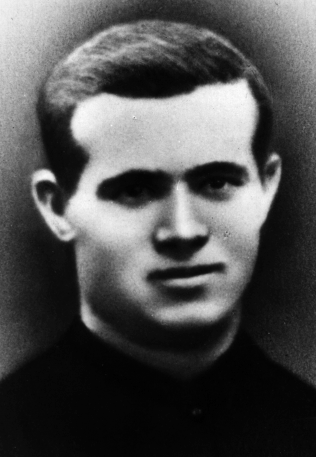
Jun 11, 2022 | From the martyrs
Claretian Missionary. 23 years old. Student of Theology. He was born in Almatret, a small village of the Province and Diocese of Lérida, Spain, on August 18, 1913. The early death of his mother meant that José María based his formation on the care of his father and teachers. It is not surprising in José María that he always had a somewhat dour character, although with a sympathetic manner, “frank and open, and a well-developed sense of justice”. His teacher, impressed by the boy’s qualities, suggested that he go to a seminary for religious. – And what would I be?” asked the boy. – Well, perhaps a great sage. The fact is that José María, with the intuition of a child, saw that it was God’s plan, for to the companion who wanted to discourage him, he replied calmly: “I have a vocation, and only God can take it away from me”. And to his father, who visited him in the Seminary and tested him by telling him why he did not leave once he had taken advantage of his studies, he said: “No, that would be misbehaving with the Congregation. Besides, I have a vocation and I want to be true to God’s call”. Thus disposed, she entered the novitiate and was professed in the Congregation of the Missionary Sons of the Heart of Mary on 15 August 1930. On the final day of his studies, he was martyred on 13 August 1936. Before his death, he signed his name with a patriotic and religious “Viva España Católica”. He was beatified by Pope John Paul II on 25 October 1992.
Blessed Fr. Claret the Thinker
Since there are many different prisms that refract the light of reality towards God, according to the perfections under which we consider him, Fr Claret chose his eternity. The thought of eternity was like a magic wand and set in motion all the forces of his heart. Already as a child, when he was four or five years old, when he could not sleep, he would sit on his bed and there, in holy reflection and with his eyes looking at heaven, he would spend the hours thinking of the terrible “always”… “never” of the sufferings of hell; making numerical calculations about eternity and never reaching the end; considering the eternity of God, he had the things of this world in their just value, seeing their passing, their limited reality and little consistency, and the vaporousness of time; absorbed in these contemplations his spirit was burning with the love of the Lord and he was encouraged to pray for the conversion of sinners and the dying.
Later, when he was trying to make his choice of state, moved by the memory of eternity that had been so deeply engraved on him in his childhood, and having given up the flattery that the world offered him, he courageously embraced the priestly vocation, and once he had climbed the steps of the holy altar, he tirelessly travelled through Spain, the Canary Islands, placed himself at the service of Propaganda Fide, went to Cuba, preaching everywhere the “tempus non est amplius”, “there is no more time”, this was the vertex around which the activity of Fr. Claret; this was the motive of his preaching and writings; this was the end to which he directed all his efforts in conquering souls for Jesus Christ.
Another fruit of the thought of eternity was the motto that, like a faithful soldier of Christ, he displayed on his coat of arms, the ardent “charitas Christi urget nos”, the charity of Christ and the zeal for the salvation of souls urges me; seeing the brevity of time and how much has to be done to win the world for Jesus Christ stimulates and urges me in such a way that I feel my breast burning with the desire to travel the whole world and save it with the preaching of the doctrine of Jesus Christ and the brevity of human things.
Fr Claret was certainly not mistaken in considering the things of this world in this way, for how was it possible for it to be so, if he considered everything in relation to God to whom it belongs by essence to be unchangeable, eternal, the centre of our happiness and the supreme reason for all that exists?
May God raise up many men like Claret who preach the eternity of God and the finiteness of what is before our eyes, and make the different classes of the present society come a little more to their senses. Oh! If we were to consider things through the prism of eternity, that is, if we were thinkers, how different the men of the present century would be, and how different the spiritual world of souls would look.
José M. Ormo C.M.F.
Cervera, January 28, 1934.

Jun 11, 2022 | Noticeboard
These are strong words in a world that from the beginning has been a place of conflict, disputes and enmity on all sides, where we constantly pigeonhole others on the basis of their ideas, their customs and even their way of speaking or dressing. Ultimately, it is the reign of pride and vanity, where each person thinks he or she has the right to dominate others. Nonetheless, impossible as it may seem, Jesus proposes a different way of doing things: the way of meekness. This is what we see him doing with his disciples. It is what we contemplate on his entrance to Jerusalem: “Behold, your king is coming to you, humble, and mounted on a donkey” (Mt 21:5; Zech 9:9).
Christ says: “Learn from me; for I am gentle and humble of heart, and you will find rest for your souls” (Mt 11:29). If we are constantly upset and impatient with others, we will end up drained and weary. But if we regard the faults and limitations of others with tenderness and meekness, without an air of superiority, we can actually help them and stop wasting our energy on useless complaining. Saint Thérèse of Lisieux tells us that “perfect charity consists in putting up with others’ mistakes, and not being scandalized by their faults”.
Paul speaks of meekness as one of the fruits of the Holy Spirit (cf. Gal 5:23). He suggests that, if a wrongful action of one of our brothers or sisters troubles us, we should try to correct them, but “with a spirit of meekness”, since “you too could be tempted” (Gal 6:1). Even when we defend our faith and convictions, we are to do so “with meekness” (cf. 1 Pet 3:16). Our enemies too are to be treated “with meekness” (2 Tim 2:25). In the Church we have often erred by not embracing this demand of God’s word.
Meekness is yet another expression of the interior poverty of those who put their trust in God alone. Indeed, in the Bible the same word – anawim – usually refers both to the poor and to the meek. Someone might object: “If I am that meek, they will think that I am an idiot, a fool or a weakling”. At times they may, but so be it. It is always better to be meek, for then our deepest desires will be fulfilled. The meek “shall inherit the earth”, for they will see God’s promises accomplished in their lives. In every situation, the meek put their hope in the Lord, and those who hope for him shall possess the land… and enjoy the fullness of peace (cf. Ps 37:9.11). For his part, the Lord trusts in them: “This is the one to whom I will look, to the humble and contrite in spirit, who trembles at my word” (Is 66:2).
Reacting with meekness and humility: that is holiness.Cf. EG, 71-74

May 12, 2022 | Noticeboard
“There can be any number of theories about what constitutes holiness, with various explanations and distinctions. Such reflection may be useful, but nothing is more enlightening than turning to Jesus’ words and seeing his way of teaching the truth. Jesus explained with great simplicity what it means to be holy when he gave us the Beatitudes (cf. Mt 5:3-12; Lk 6:20-23). The Beatitudes are like a Christian’s identity card. So if anyone asks: “What must one do to be a good Christian?”, the answer is clear. We have to do, each in our own way, what Jesus told us in the Sermon on the Mount”. (Gaudete et Exsultate, n.63)
1. “Blessed are the poor in spirit, for theirs is the kingdom of heaven”
The Gospel invites us to peer into the depths of our heart, to see where we find our security in life. Usually, the rich feel secure in their wealth, and think that, if that wealth is threatened, the whole meaning of their earthly life can collapse. Jesus himself tells us this in the parable of the rich fool: he speaks of a man who was sure of himself, yet foolish, for it did not dawn on him that he might die that very day (cf. Lk 12:16-21).
Wealth ensures nothing. Indeed, once we think we are rich, we can become so self-satisfied that we leave no room for God’s word, for the love of our brothers and sisters, or for the enjoyment of the most important things in life. In this way, we miss out on the greatest treasure of all. That is why Jesus calls blessed those who are poor in spirit, those who have a poor heart, for there the Lord can enter with his perennial newness.
This spiritual poverty is closely linked to what Saint Ignatius of Loyola calls “holy indifference”, which brings us to a radiant interior freedom: “We need to train ourselves to be indifferent in our attitude to all created things, in all that is permitted to our free will and not forbidden; so that on our part, we do not set our hearts on good health rather than bad, riches rather than poverty, honour rather than dishonour, a long life rather than a short one, and so in all the rest”.
Luke does not speak of poverty “of spirit” but simply of those who are “poor” (cf. Lk 6:20). In this way, he too invites us to live a plain and austere life. He calls us to share in the life of those most in need, the life lived by the Apostles, and ultimately to configure ourselves to Jesus who, though rich, “made himself poor” (2 Cor 8:9).
Being poor of heart: that is holiness.
Cf. EG, 67-70





